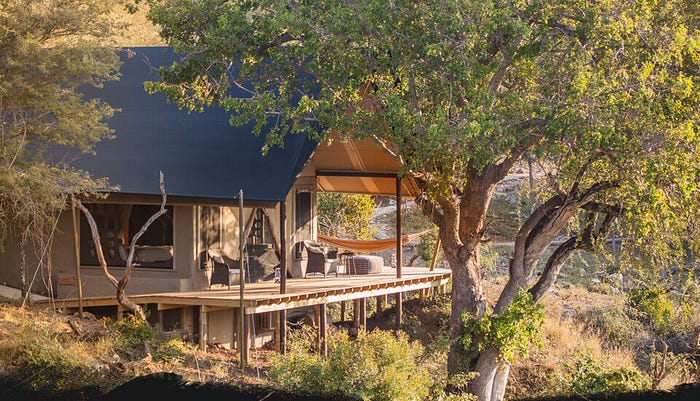Make Your Next Safari Visit Sustainable
Eco-tourism is all about traveling without leaving a heavy footprint as you pass through. By staying in eco-friendly lodges and being conscious of the impact your trip has on the environment you will be helping the planet heal while enjoying luxurious accommodation and experiencing amazing wildlife. Sustainability does not have to be a burden, it can be an opportunity to build beautiful memories while contributing to nature.
Here are ten awesome eco-friendly lodges located in Africa. I’ve been to one or two of them but would love to travel to each and every one of these in the future. Take a look, maybe it’s time you take a sustainable African trip!
1. Mombo Camp, Okavango Delta — Botswana
The Okavango Delta is widely known as one of the top places to view game in the whole of Africa (and maybe even the world!) and Mombo Camp is located right there. To make sure this iconic region is protected, the camp adheres to strict environmental standards. Even from the time it was constructed, sustainability was held at heart. Mombo hired a professional arborist to ensure that local trees and plants were not adversely affected during the construction of the lodge. Mombo Camp is 100% powered by solar energy through solar panels and inverters. All waste water is treated in a specialized sewage plant before it is returned to the earth. High quality drinking water for guests is produced through reverse osmosis.

2. Phinda Game Reserve — South Africa
Located in the wild and wonderful KwaZulu Natal province in the eastern side of South Africa, Phinda Game Reserve is super luxurious, but not at the cost of sustainability. All the chalets feature in-house water filtration systems, they use glass bottles instead of single-use plastic water bottles, the air conditioning is efficient and timers have been installed on water heaters and pumps. Phinda also supports the Pangolin Conservation Experience and offers guests the unique opportunity to join a research team that locates these rare animals and do health checks on them.
3. Campi ya Kanzi — Kenya
This lodge is not only a sustainable tourist destination, the owners are also passionate about community development. They established the Maasai Community Wilderness trust, a community trust that helps take care of the Maasaai people in the area. The trust has opened a primary school, medical dispensary and three clinics.
4. Bisate Lodge — Rwanda
Located next to the exciting Volcanoes National Park, this lodge is super innovative when it comes to sustainability. They’ve installed a water filtration system that makes using bottled water totally unnecessary and an inventive rain water harvesting system to supply some of this water. The onsite garden reduces food transportation and organic waste is repurposed for compost or local stock feed. Bisate doesn’t use plastic bags, disposable coffee cups, straws or cling wrap and instead uses beeswax wraps and re-usable coffee cups made of bamboo.

5. Kwitondo Lodge — Rwanda
Another stunning lodge near the Volcanoes National Park, Kwitondo’s construction was done to make as light as possible a footprint. Thermal engineers evaluated and optimized energy performance before construction began. Mechanical ventilation systems were installed instead of air conditioning. Local materials and labour were used throughout the construction. The developers were so serious about sustainability that they opened a nursery before even beginning construction on the lodge. Named Akarabo, the nursery has planted over 250,000 trees and shrubs as part of a reforestation project for the park. Going forward, there are plans to do more reforestation projects that will eventually lead to growing the habitat of local wildlife, which includes the endangered mountain gorilla.

6. Gibb’s Farm — Tanzania
Everything at Gibb’s Farm is recycled or upcycled — nothing goes to waste! There are tailors that thread scraps of material into cushion covers and other material items, carpenters carving pieces of wood into beautiful sculptures and paper makers who make a mixture of waste paper and elephant dung and turn it into stunning stationary and greeting cards. These items are sold in the gift shop at the lodge.

7. Mfuwe Lodge — Zambia
Run entirely on solar power, each chalet at Mfuwe has its own solar water heating system and relies completely on solar energy for electricity and to pump water. The lodge also has a worm farm where organic waste is composted to produce fertilizer which is rich in nutrients and 100% organic. This is used in tree planting initiatives in local villages. Mfuwe also works with The Bushcamp Company in an annual fundraising drive that generates $400,000 every year to support the Luangwa Conservation and Community Fund, an organization that supports local conservation and community initiatives.

8. Garonga Safari Camp — South Africa
This lodge was given a complete environmental refurbishment. The sewage system is a state-of-the-art six-phase filtration system that filters waste water thoroughly and converts it into drinking water for local animal populations. The vegetable garden and chicken coop supplies as much as a third of the lodge’s food needs and all the vehicles used for game drives are run on bio-fuel.

9. Xigera Lodge — Botswana
The goal of this lodge is to help the surrounding wildlife to survive and thrive. The lodge is committed to the TreadRight initiative and has committed to removing all single-use plastics and also converting to 100% solar energy. The installation is planned to be the largest solar farm in the Okavango Delta and will eventually be used to charge the lodge’s game-drive vehicles. Hot water comes from thermodynamic geysers that use minimal energy and the tinted glass installed throughout the lodge enables the energy-efficient air conditioning system to work.

10. Honaib Valley Camp — Namibia
Most of the materials used to build this eco-friendly lodge were locally sourced, lowering the carbon footprint of material transport and giving local craftspeople work opportunities. The accommodation consists of luxurious tents that sit on decking made of a locally produced composite material that consists of recycled plastic and bamboo. Honaib Valley Camp runs on 100% solar power and sewage is treated on the site.

